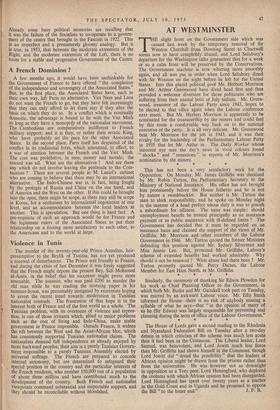Violence in Tunis
The murder of the seventy-year-old Prince Azzedine, heir- presumptive to the Beylik of Tunisia, has not yet produced a renewal of disturbances. The Prince was friendly to France, and during the crisis of last December it was freely suggested that the French might depose the present Bey, Sidi Mohamed al-Amin, in the belief that his successor might prove more amenable. The assassin, who was paid £200 to murder the old man while he was reading the morning paper in his summer-house, was presumably instigated by extremists hoping to arrest the recent trend towards moderation in Tunisian nationalist counsels. The frustration of that hope is in the interest both of France and of the free world as a whole. The Tunisian problem, with its overtones of violence and repres- sion, is one of those irritants which, allied to major problems such as the cost of living and Indo-China, make stable government in France impossible. Outside France, it widens the rift between the West and the Asian-African bloc, which has consistently supported Tunisian nationalist claims. The nationalists demand full independence as already enjoyed by more backward peoples; their aim is a purely Tunisian Govern- ment responsible to a purely Tunisian Assembly elected by universal suffrage. The French are prepared to concede internal autonomy, but are determined to safeguard their special position in the country and the particular interests of the French residents, who number 150,000 out of a population of about three million and have contributed much to the development of the country. Both French and nationalist viewpoints command substantial and respectable support, and they should be reconcilable without bloodshed.


































 Previous page
Previous page